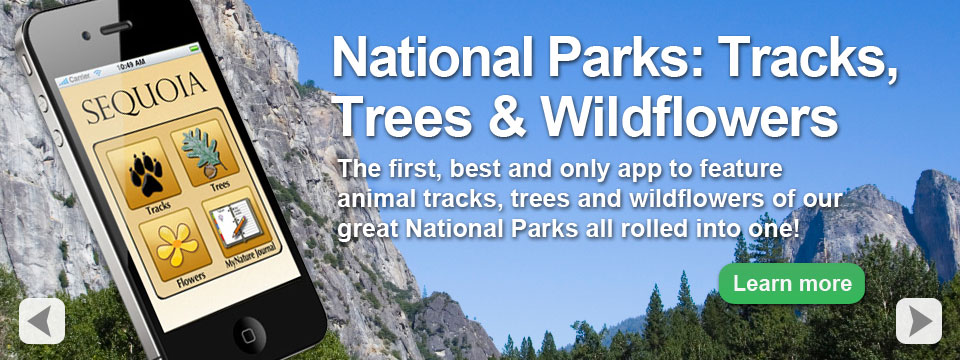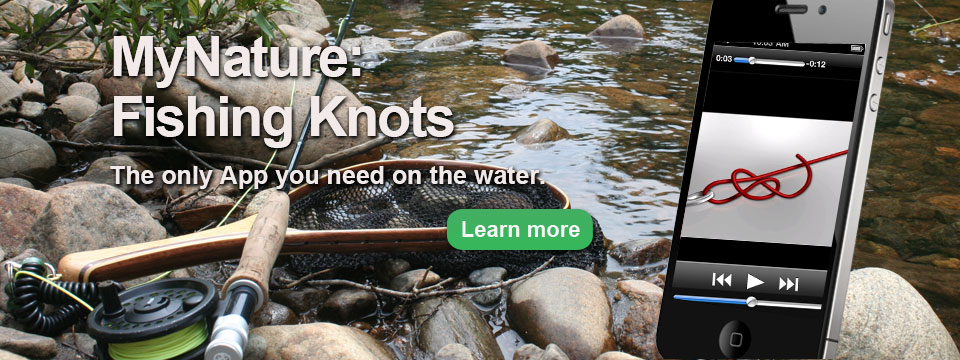14 Apps That Will Revolutionize Your Walk in the Woods
from Wildlife Promise
 Many argue that smartphones are keeping kids out of the woods and locked up behind their screens. However, these devices and the new mobile apps they put at our fingertips assist us in a lot of different ways, even when you’re out of the house and in the wilderness. You can read some thoughts around NWF’s findings in the report Friending Fresh Air: Balancing Nature and Technology.
Many argue that smartphones are keeping kids out of the woods and locked up behind their screens. However, these devices and the new mobile apps they put at our fingertips assist us in a lot of different ways, even when you’re out of the house and in the wilderness. You can read some thoughts around NWF’s findings in the report Friending Fresh Air: Balancing Nature and Technology.
While exploring nature is often regarded as a tech-free activity, it’s great to know that in the 21st century there are tech-savvy tools that help can us enjoy nature and wildlife in a whole new way.
Here are 14 apps that will turn even the most urban person into a naturalist in no time.
 1. The North Face Trailhead App
1. The North Face Trailhead App
The outdoor apparel retailer The North Face has launched an exploratory trail-finding app for iPhone. Its function is to help users find and share the best paths and routes for hikers, skiers, fly fishermen, and others who don’t want to get lost when they head for the hills. The free app enables users to search by activity type and distance, proximity (either from your current location using GPS or by zip code), and user ratings. The database of routes is pulled from EveryTrail.com, a platform for swapping trails with fellow enthusiasts.
 2. Florafolio
2. Florafolio
The ultimate native plant resource for nature enthusiasts is now available as an app for the iPhone and iPod Touch. Florafolio is an interactive guide that allows users to focus on the stunning variety of trees, shrubs, perennials, ferns, vines, and grasses indigenous to Eastern Canada and the Northeastern region of the US. It’s an excellent directory for anyone who’s looking to identify native plant species in the wild.
Designed for both iPhone and iPad, iBird Plus is one of the more pricier apps, at $14.99. However its database has a total of 938 species so it’s far more extensive than some of the other bird apps available today.
Not as extensive as the iBird Plus, WildLab Bird is a free app that can identify 200 species of birds. It engages learners with the basics of bird identification. Along with associated curricula and educational activities found on the WildLab.org Web site, WildLab Bird is a powerful way to see the environment in a whole new way.
Leafsnap, free on iOS, is a comprehensive nature-guide app that features an extensive directory of North American plants. You can rifle through the directory manually, and filter the species by leaf shapes, flowers, fruit, and so on. Tapping an entry takes you to a photo-rich data page that displays examples of the plant’s bark and seeds. There is also a text description of habitats and bloom times.
Priced on upwards of $8 USD, according to naturalist D. Thomas this is “a must-have app for anyone outdoors.” MyNature Animal Tracks allows users to identify any animal track in your area when you reference this well-made guide. It is chock-full of great information and photos that are not just illustrations, but actual photographs of a wide variety of animal tracks.
Explore! Learn! Record on Androids! iNaturalist allows you to record your observations from the natural world for free and contribute them to iNaturalist.org, a social network for naturalists. Users can get started quickly by reviewing the app’s guide. A recent update was added in June 2013.
Free for iPhones and Androids, Project Noah is the best way to share your wildlife encounters and help document our planet’s biodiversity. Naturalists can upload their own wildlife photos or review those uploaded by others from across the globe.
Trails-GPS Tracker is the first GPS app that allows you to record, export, and import tracks directly on your iPhone! Prepare and review your outdoor adventures on the iPad as well, since there’s an easy exchange between iPhone and iPad. Priced at $3.99, Trails was first released five years ago, so it’s had several upgrades.
TreeBook is the authoritative guide to 100 of the most common trees in North America. It was produced by veteran forester Steve Nix (of forestry.about.com fame), and developed by Ash Mishra (developer of the very popular CBC Hockey and CBC Radio apps). This free application’s easy, intuitive interface provides a way to determine the type of tree you’re looking at — with images, search, synonyms for trees, layman terms, and, for the more scientifically minded, detailed terminology.
Available for 99 cents, Google’s Android smartphone and their developers Blackbonnet have just launched an app called Where’s a Bear. It’s a great service for tourists who want to track wildlife sighting alerts for not only those big old scary grizzly bears, but any other species of your choice. Its intent is to allow users to maximize their Yellowstone vacation time by taking the guesswork out of finding the best places to see the park’s primary residents.
The Yellowstone Wildlife app which doesn’t include the “finding the bear” feature (noted above) is now also available on iPhones and iPads as well as Androids. You can obtain real-time updates of Yellowstone wildlife sightings for free.
![]() 13. National Geographic Birds
13. National Geographic Birds
Now available for $9.99, National Geographic Birds was designed for iPhones, iPads, and iPod Touch. It offers an innovative, beautiful, and interactive field guide to the birds of North America. Whether you’re new to bird watching or already an expert, this completely updated and redesigned app makes spotting, identifying, and understanding birds easier than ever.
Check out more than 1,000 species of mammals, birds, snakes, bugs, worms, WildObs Observer. Designed by Neukadye, this free iPhone app lets you record wildlife and contribute them both to your database, and to National Wildlife Federation’s Wildlife Watch program. It’s a neat experience to learn what naturalists around you are seeing and uploading.
If you’ve never taken that walk in the woods prior to reading this blog, perhaps these innovative apps will motivate you to do so now. Whether you have a passion for flowers, trees, plants, mammals, birds reptiles, rocks, or anything in between, technology can be your friend when you take that next fork in the road.
About the Author
This is a guest post by Drew Hendricks, an environmental and tech addict that has written for a variety of publications including Technorati, Forbes and Huffington Post.
























What Others Have to Say